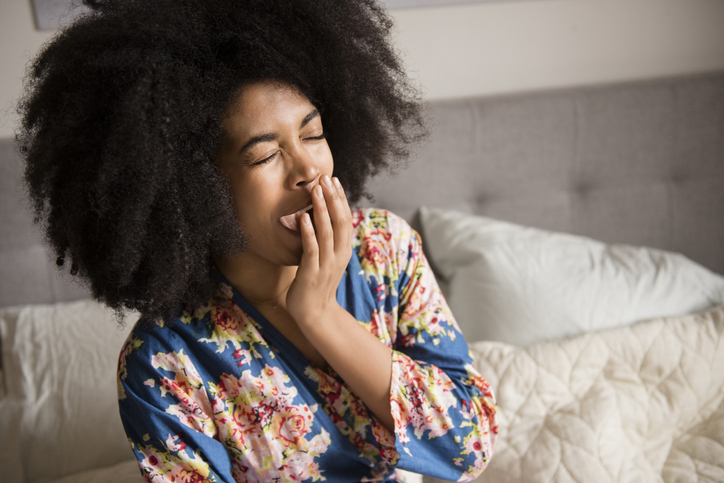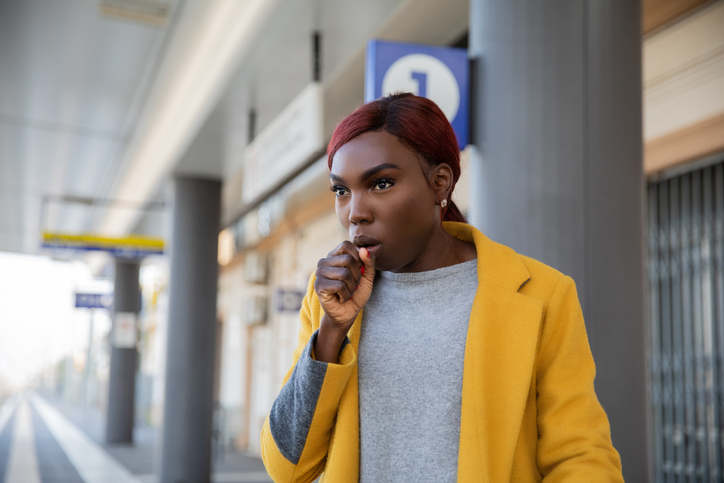Is It COVID-19 Or Seasonal Allergies?
Share the post
Share this link via
Or copy link

Source: PICHA Stock / Getty
While influencers take their photos of Super Blooms, going out of their way to immerse themselves in flowers and grass, many individuals stay far, far away from anything like that this time of the year – allergy time, that is. Tree pollen comes out in full force in March and April, and grass pollen hits us in May, sometimes sticking around through July. Maybe if this were the year 2019 or before, waking up with the sniffles wouldn’t be too much cause for concern. You’d just know it was allergies. But since COVID-19 took the world by storm, any symptom at all in the nose/chest/throat can make a person very worried. In cold and flu season, you worry every cough is COVID-19, and just when you think you can get a break from those concerns, allergy season makes you question your sneezes.
The CDC did publish this helpful Venn diagram detailing where the overlap exists between allergy symptoms and COVID-19 symptoms. The good news is that there’s a lot of overlap, so what you think is COVID-19 could be allergies. The bad news is…there’s a lot of overlap, so what you think is allergies could be COVID-19. While it sheds some light on the situation, the Venn diagram doesn’t quite go into enough detail, so we consulted some medical sources to get more clarity on the differences between COVID-19 and allergy symptoms.

Source: Marko Geber / Getty
Sore throat
Could be either but more common with COVID-19
If you have a sore throat, you may panic because, like for many people, a sore throat may be the first sign you’re getting sick. The Venn diagram does say COVID-19 and allergies can cause a sore throat. However, Mayo Clinic goes into further detail, explaining that a sore throat from allergies is rare, while a sore throat with COVID-19 is common. If you do have a sore throat due to allergies, it’s likely postnasal drip causing it. Postnasal drip inflames and irritates the throat. It’s most common at night, when you lie down, and gravity makes the extra mucus your body creates to fight off pollen drip down your throat. Since it happens at night, you’ll notice sore throats related to allergies are strongest in the morning. A COVID-19 sore throat can last all day.

Source: LaylaBird / Getty
Nausea/vomiting
Never allergy-related; sometimes COVID-19-related
Love MadameNoire? Get more! Join the MadameNoire Newsletter
We care about your data. See our privacy policy.
Nausea and vomiting can make an already miserable situation worse since you can’t simply stay in bed and rest – you’re constantly running to the toilet, when you’re low on energy as it is. If you are unsure whether it’s allergies or COVID-19 that has you feeling under the weather, experts say nausea and/or vomiting tip things in the direction of COVID-19, as that is never a symptom of allergies, and occasionally a symptom of COVID-19. Research has found there are several reasons the virus can cause these symptoms, including a systematic inflammatory response, or psychological distress. It may even result as a side effect from certain drugs.

Source: Delmaine Donson / Getty
Muscle aches
Could be either, but more likely COVID-19
If your muscles are so sore that it’s difficult to simply role over in bed, COVID-19 is more likely the culprit than allergies. Allergies can cause some sore muscles – particularly a sore neck from sneezing, or joint pain due to an inflammatory response – but won’t cause all-body aches the way COVID-19 does. If your entire body aches, unfortunately, the virus may be to blame. It’s so aggressive, in fact, that it causes the body to attack itself. Research has found that for some, it causes issues such as rheumatological problems that require a lifetime of management. In certain cases, doctors have given a COVID-19 diagnosis based on musculoskeletal imaging.

Source: ljubaphoto / Getty
Sneezing
Likely allergies
With COVID-19 on the forefront of nearly everyone’s minds, it’s become common to see people move swiftly away from an individual who sneezes. Some may even joke, “She has coronavirus!” Any act that sends fluids flying makes people uneasy right now, and rightfully so. But the truth is that sneezing is very uncommon with COVID-19. You can scan the CDC’s list of symptoms, and find that sneezing does not come up. Any sneezing during this time of the year is likely due to allergies. That isn’t to say that a person cannot have both allergies and COVID-19 at the same time, so if other COVID-19 symptoms are co-occurring, get tested.

Source: Roy Hsu / Getty
Itchy nose, eyes, or mouth
Almost certainly allergies
When an allergen is present, your body releases something called histamines (it’s why you buy antihistamines to treat allergy symptoms). Histamines cause swelling and inflammation, and can create an itchy feeling around your eyes, nose, and/or mouth. These can also cause puffy eyes or puffy lips. All of these symptoms are associated with allergies, but not with COVID-19. So if you find yourself rubbing your eyes or scratching your face, nearby pollen or pet dander is most likely to blame – though you should still wash your hands before scratching your face, since COVID-19 is still a risk.

Source: andresr / Getty
Loss of taste and/or smell
Could be either COVID-19 or allergies
A loss of taste and/or smell is associated with both COVID-19 and allergies. Naturally, when your body is producing excess mucus in response to allergens, and your nose is inflamed, you may struggle to detect certain tastes and smells as well as you normally would. In fact, the CDC says this can occur “sometimes” with allergies. However, they say it’s “usual” with COVID-19. The main difference would be that, with COVID-19, the loss will come on suddenly, often before other symptoms, and be rather long-lasting. With allergies, your sense of taste and smell can come and go as the other symptoms fluctuate.

Source: JGI/Jamie Grill / Getty
Severe fatigue
Could be either COVID-19 or allergies
Both allergies and COVID-19 can, unfortunately, cause extreme fatigue. Allergies can do this for simple reasons, including the fact that congestion interrupts your sleep and makes it difficult to wake feeling rested. The process of fighting histamines is also tiring for your body, so during allergy season, you may feel tired all day, no matter how long you sleep. Having your immune system fight off a virus such as COVID-19 is also very exhausting on your body. If you are feeling fatigue, you’ll need to reference the other symptoms on the list to narrow down the cause, and possibly get a COVID-19 test.

Source: LeoPatrizi / Getty
Cough
Could be either COVID-19 or allergies
Today, we think a cough is synonymous with COVID-19 and keep our distance if we hear someone hacking. However, it could be allergies or COVID-19. When it is due to COVID-19, the cough will be a dry one. Coughing is more common with COVID-19 than it is with allergies. However, if your cough seems to come on only when you are in certain places or near certain things, and then subsides, it could be due to allergies as your throat may itch, causing a cough, in the presence of allergens. A COVID-19 cough will not come and go based on your surroundings. It will remain active throughout your illness.

Source: zhihao / Getty
Diarrhea
COVID-19
Diarrhea is not associated with seasonal allergies. It can be a response to a food allergy or sensitivity, as your body attempts to expel the problematic ingredient, but will not be a response to pollen or dander allergies. If you are experiencing diarrhea along with other identified COVID-19 symptoms, it may be time to get tested. Research has found that the COVID-19 virus may affect the digestive tract, and one study at Stanford Medicine found that one-third of their subjects with COVID-19 experienced digestive symptoms, including diarrhea. To add insult to injury, when COVID-19 has you so tired you can’t get out of bed, you may have to often, if you have this symptom.

Source: Aja Koska / Getty
Fever
COVID-19
While allergies can do many things to your head, like leave you feeling foggy, dizzy, and sleepy, they will not cause a fever. Allergies can strike during the warmer months, which can lead to some confusion around night sweats and general overheating. However, if you take your temperature with a thermometer and find you do, in fact, have a fever, then COVID-19 could be to blame. A fever is generally categorized as a temperature above 100.4 degrees and is one of the most common symptoms of COVID-19. That being said, some COVID-19 patients never develop a fever. But no allergy patients ever do.







